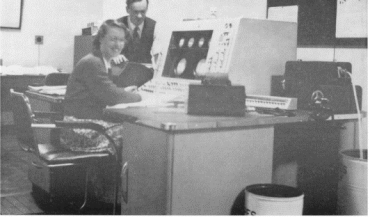
1985 and the Mobile Revolution in the UK
John Carrington, the founding MD of Cellnet and Archives of IT Chair of Trustees, gives his personal view of one of the most exciting developments in communications – the advent of mass mobile telecommunications.

AI is a great equaliser to support more opportunities and social mobility
AIT CEO, Tola Sargeant writes about the positivity surrounding AI at London Tech Week and how she was struck by comments from NVIDIA CEO, Jensen Huang on how the technology can be a leveller

WebAIM Million Report 2025 highlights opportunities for improving digital accessibility
Chris Winter writes about the WebAIM Million Report on the accessibility of the world’s top one million home pages and how little has improved since the first report in 2019.

A Chinese perspective on IT professionalism and cancel culture
Ziyu Wang and Lang Cheng, undergraduates at UCL, have written two articles as part of a placement with AIT inspired by our 2025 Forum on Norms for the Digital Age.

Can AI make interaction with archives more personal and engaging?
Yuhui Xia is studying for a Master’s at the University of Manchester and joined Archives of IT on a placement earlier this year and writes about how AI can enhance the accessibility of archives.

GSM pioneer, Mike Short, offers his top ten mobile phone attributes
Dr Mike Short CBE, has four decades of experience in telecommunications and here he offers a background to how and why mobile phones have surpassed the landline telephone.

Beware of missing Accessibility Statements on websites
Chris Winter writes that an Accessibility Statement informs users about the accessibility of a website, and its absence is a warning that the website may have poor accessibility.

The Role of World Book Day in Promoting Technology and Storytelling
On World Book Day, Beverly Clarke explains how reading and storytelling have the power to bring generations together through literature.

Raising awareness with organisation about digital poverty and accessibility
Chris Winter explains how he is not a technical expert when it comes to digital accessibility but focuses on raising awareness with organisations who choose not to improve the accessibility of their websites and mobile apps.

Making the World Wide Web more Accessible
Chris Winter’s latest blog details the four most common types of non-compliance to the Web Content Accessibility Guidelines (WCAG) identified by the WebAIM Million annual reports of the past six years.

Inspiring Future Innovators Through Technology Books: Aligning with AIT’s mission
The Technology Books for Children volunteer reviewers recommend seven tech-themed books for children aged 4-14, which aim to nurture a deep understanding of technology, helping young readers envisage the role they can play in the digital world.

Beverly Clarke MBE and her new charity Technology Books for Children
In the ever-evolving landscape of the tech industry, Beverly Clarke MBE, a leader in the education and tech sector, has set out on a mission to inspire young minds and foster a love for technology through reading for pleasure on tech topics.

Low colour contrast makes websites illegible
The IT industry can do more for the disabled – Part 12. Chris Winter, an Ambassador for the Digital Poverty Alliance and evangelist for digital accessibility, is back with his latest blog which focuses on the disadvantages of low colour contrast on websites
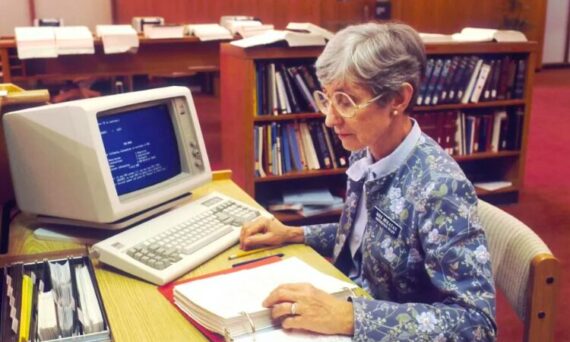
University students complete work placement with AIT
Mark Jones, Adviser with AIT, writes about the progress of the most recent cohort of students – from Swansea and Manchester universities and University College London – who have recently completed work placements with AIT

The IT industry can do more for disabled people – Part 11
In his latest blog, Chris Winter, looks at digital accessibility legislation and regulation and asks why it isn’t always implemented. Is it unconscious bias, or as he likes to call it, corporate ignorance, or something worse: a conscious bias?

The IT industry can do more for disabled people – Part 10
Chris Winter discovers the Valuable 500 white paper on Environmental Social and Governance (ESG) and Disability Data and says that all organisations should include W3C Web Content Accessibility Content within their ESG programmes

The IT Industry must do more for disabled people - Part Nine
Chris Winter writes about the need not only for regulation and legislation, but also self-regulation.

The IT industry must do more for disabled people - Part Eight
In his latest blog Chris Winter argues that a lack of awareness of how disabled people use computers is a factor in low levels of digital accessibility.
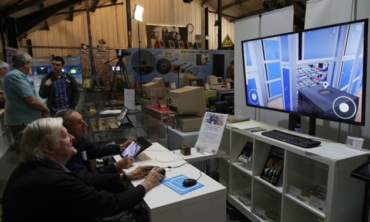
LEO National Lottery Heritage Fund Event
Our Director, Tom Abram attends a celebration of the National Lottery Heritage Fund project to capture the story of Lyons Electronic Office

Evolving and Exploiting Packet Switched Networks
At the AIT Forum on the Histories of the Internet taking place on 9 January 2024 Edward Smith, Chris Miller and Jim Norton will lead a discussion on the Innovation and Implementation – Successes and Failures panel chaired by Robin Mansell

The IT Industry must do more for disabled people - Part Seven
A summary of his previous six blogs by Chris Winter.

Colossus designer, Tommy Flowers recognised with English Heritage Blue Plaque
Adrian Murphy blogs on an unsung hero’s vital war work and the key contribution he made to the development of the modern computer.

From X-ray crystallography to computing history
Find out about a new podcast on the history of women working in computing in our guest blog by science writer Georgina Ferry.

The Coming AI Tsunami by John Handby
At the AIT Forum on the Histories of the Internet taking place on 9 January 2024 John Handby will chair a session entitled: AI Future Realities.

The IT Industry must do more to help disabled people - Part Six
Chris Winter on whether the ESG business framework is a potential ‘silver bullet’ to significantly improve the accessibility of digital services?

The Management of Change - Outsourcing Business Processes
Stephen Baker blogs on the challenges of a major outsourcing project at GSK in 2004.

IT and Business Change in the 1960s: a brief history of the CUBITH project
Ann Moffatt remembers an early example of using IT for the management of strategic change, in this case hospital design and construction.
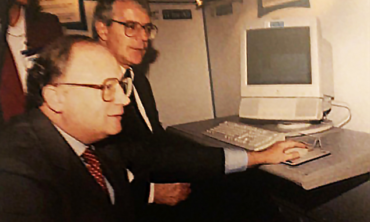
Government in the early age of the internet
Ian Taylor MBE, Minister for Science, Space and Technology in John Major’s government, recalling a first in the use of the internet by government in the launch the IT for All programme.

The IT Industry must do more to help Disabled People - Part Four
In this blog Chris Winter starts to discuss how to improve the accessibility of websites.

The IT Industry must do more for disabled people - Part Five
Here Chris Winter discusses the ‘Green Agenda’.
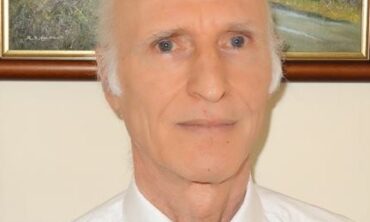
Professor Stephen Temple and ETSI
A new blog from Richard Sharpe on the 35th Anniversary of the ETSI Technical Assembly, chaired by Professor Stephen Temple.

The IT Industry must do more to help disabled people - Part Three
In this blog entry Chris Winter continues to focus on the size of problem, encompassing colour blindness and other areas. Future blog entries will begin to explore solutions.

What has the City of London ever done for us, the IT sector?
Richard Sharpe looks at the reasons UK companies, like ARM, are choosing to float in New York and not on the London Stock Exchange

LEO Pioneer Ray Shaw dies aged 98
Richard Sharpe looks back at the life of LEO pioneer Ray Shaw, who has died aged 98.

John Wallace: Using the Pegasus computer to automate UK banking
John Wallace shares his experience using the Ferranti Pegasus, taken from his notes of a presentation to the British Computer Society in Year 2000 and a full-length interview to be published on Archives of IT.

Leo Remembered - Book Review by Richard Sharpe
LEO Remembered is an excellent contribution to the history of UK computing with its focus on the world’s first computer for business applications. Read Richard Sharpe’s thoughts on this book by Hilary Caminer and Lisa-Jane McGerty.

The IT Industry Must do more for Disabled People - Part Two
A second blog from Chris Winter on this hugely important subject.
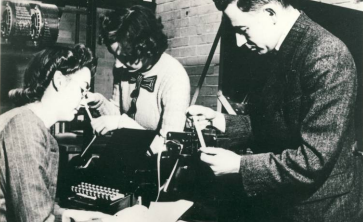
Kathleen Booth, Computer Pioneer, Bows Out at 100
New Blog from Richard Sharpe on the pioneering work of Kathleen Booth.
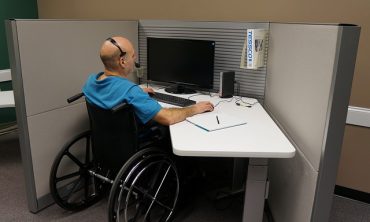
The IT Industry must do more for disabled people - Part One
New blog from Chris Winter, an Ambassador for the Digital Poverty Alliance, an evangelist for digital accessibility and a former IBM Fellow, now retired.

How Hard is it to Create a Microchip Strategy?
Richard Sharpe ponders on the continued inability to create a microchip strategy in the UK.

Crossing the Cyber Rubicon
Blog from Tom Abram, Director, Archives of IT on cyberspace and why it is recognised as the fifth theatre of war alongside land, sea, air and space.

Open aka Not IBM
Latest blog from Richard Sharpe on the Open Systems Interconnection (OSI) standard, and how it revolutionised Operating Systems in the 1990s.

Alan Turing Statue
Richard Sharpe looks at the efforts of King’s College Cambridge to get a statue erected in honour of Alan Turing.

The OPEN Blog - a response
Stephen Baker responds to Richard Sharpe’s blog, talking about 1980s calls for open systems.

Alastair Macdonald CB: a very civil, Civil Servant
Richard Sharpe looks back at his interview with Alastair Macdonald CB, who died earlier this year.

Capita proves that 'boring' can be good!
Richard Sharpe looks at the consistent performance of Capita that led to it happily being labelled boring.

The Great Database War 1978 to 1992
Richard Sharpe looks back through the archive and analyses key players in the database market during the 20th century.

The Rocky Road to Growth Through Mergers & Acquisitions
Richard Sharpe blogs about past mergers and acquisitions of key IT companies, and if they ever are successful.

Women in IT - Looking back on International Women's Day
Richard Sharpe looks at four of the amazing women in our archive on International Women’s Day.

Women in IT - a changing picture?
Dr Tom Abram wonders what, if anything, has really changed for women in the last 50 years, in terms of a career in IT.

The NHS and Information Systems
Richard Sharpe considers if the NHS and Information Systems is the ultimate challenge.

The Takeover of the NatWest Banking Group by The Royal Bank of Scotland
Stephen Baker blogs about when The Royal Bank of Scotland made an audacious bid for the NatWest Banking Group in 2000.

Watch the Faraday Lecture, 1975
Whilst working at Sperry Univac, Sir Desmond Pitcher gave the Faraday Lectures and made a few predictions on the development of the computer. Find out about his predictions and if they came true.
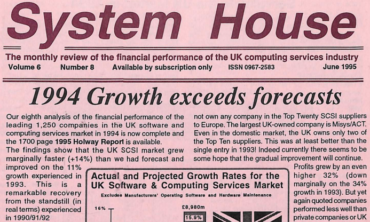
Looking back (over my shoulder?)
Dr Tom Abram takes a look back in the archives, and blogs on why 1991 was the worst year ever for the IT industry.

Looking Back at New Years Past
Richard Sharpe, interviewer for AIT and long-time journalist, looks back at IT news from 1985 and the year 2000.

Sir Clive Sinclair : Innovator Extraordinary
Tom Abram’s tribute to Sir Clive Sinclair, who died on the 16th September 2021 at the age of 81.

Back to the Future
Jim Norton gives a retrospective on the Butler Cox Foundation’s July 1989 paper ‘Pan-European Communications: Threats and Opportunities’.

Taking Account of the Unforeseeable
Mark Jones reflects on what we can learn from how the forecasts of 30 years ago turned out.

Mirrors of the Future
Michael Mainelli looks at what we could have learned from the Butler Cox papers, and what they missed entirely.

Douglas Engelbart and his 1968 vision of the Human Computer Interface
Richard Sharpe blogs on how ‘The Mother of all demonstrations’ showed the world how the mouse would transform our relationship with computers.
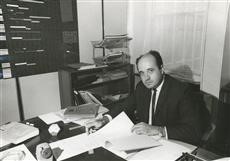
A tribute to Len Taylor, co-founder of Logica
Len Taylor who died on 26th Sept 17 at the age of 82 is remembered by Richard Holway.

The Boring Awards
IT Analyst Richard Holway remembers the Financial Times awards given to IT companies with consistent results on the Stock exchange

